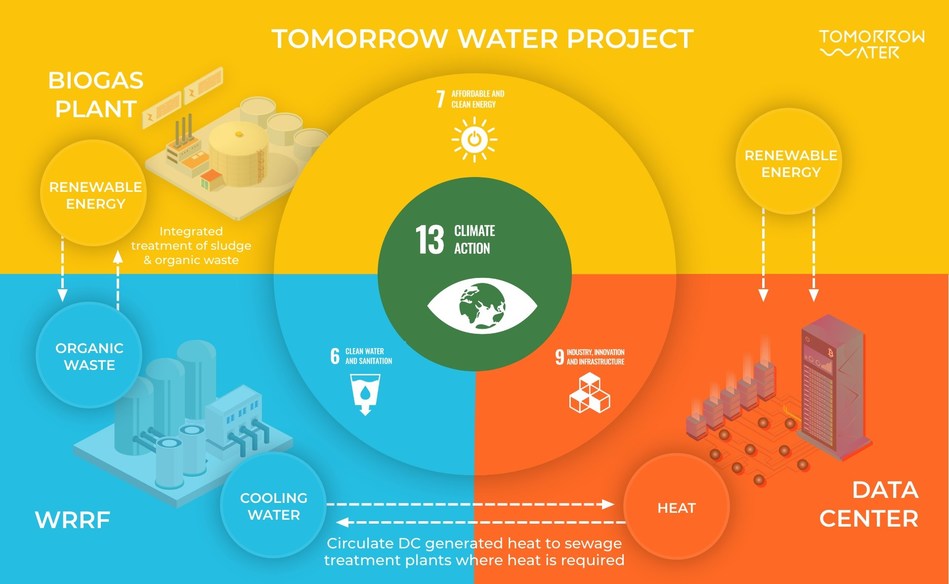Revolutionizing the Economics and Environmental Impact of Wastewater
Published on by Trudi Schifter, CEO and Founder AquaSPE in Business
Tomorrow Water, an innovative environmental solutions provider with a vision of a "Clean and Beautiful World Beyond Waste", is launching the second phase of its ambitious Tomorrow Water Project (TWP), a plan aimed at drastically improving the economics and sustainability of wastewater treatment and other key infrastructure elements around the world. Tomorrow Water seeks to implement TWP in developing countries and developed countries alike, reducing the environmental impact and costs associated with wastewater treatment and enabling positive environmental and social change globally.

Tomorrow Water Project (TWP) is a comprehensive system that converts sewage from a cost stream to a profit stream by integrating low-energy wastewater systems, AI-based value chain innovation, and rigorous resource recovery. TWP is contributing to the global paradigm shift toward digital transformation of the water and sanitation industries.
The Tomorrow Water Project is aimed at drastically improving the economics and sustainability of wastewater treatment
Tomorrow Water's philosophy is that in order to foster sustainable waste and sewage practices, wastewater itself needs to be converted from a cost stream into a revenue stream. TWP does this by recovering valuable resources from wastewater, including water, heat, energy, proteins, and nutrients, making it more economically feasible to implement sustainable water and sanitation systems in developing nations.
TWP 2.0 aims to revolutionize the value chain of wastewater treatment operations by implementing technologies and engineered solutions that harness and reuse wasted resources like heat, water, energy, and nutrients for other key infrastructure functions like energy generation and IT capacity. TWP 2.0 will also improve the cost-efficiency of wastewater treatment through water AI (artificial intelligence) and automation. In doing so, Tomorrow Water hopes to empower developing nations to deploy sustainable, reliable, and affordable sewage treatment systems.
"In addition to innovating the value chain of wastewater operations, in TWP 2.0 we intend to incorporate data centers in TWP facilities," said James Kim, COO of Tomorrow Water. "Data centers are sorely needed around the world as data processing requirements expand. The limiting factors for data centers in major cities are physical space, cooling capacity, and energy needs. By incorporating a data center on-site at a TWP facility, IT capacity can be expanded for a region in a sustainable, affordable way because the transfer of biogas energy and cooling water between TWP facilities solve data centers' traditional hurdles."
The first phase of the project (TWP 1.0) focused on creating the individual wastewater treatment and resource recovery technologies that can enable wastewater facilities to recycle valuable resources and achieve energy self-sufficiency, setting the groundwork for later stages of TWP. Tomorrow Water developed its highly efficient Proteus+ technology that converts wastewater solids into an energy production feedstock in a process called carbon diversion. When combined with the company's low-physical-footprint nitrogen removal technology called Mainstream AMX (Anammox), Proteus+ can treat wastewater in developing countries while using 50% less space and 60-70% less energy and requiring half as much time as conventional aeration-based technologies. In this phase, Tomorrow Water also integrated energy production technologies such as thermal hydrolysis and biogas production into the same facility as the wastewater plant, allowing the recycling of otherwise wasted heat, water, and electricity. For more information on the technologies developed in TWP 1.0, visit https://www.tomorrowwater.com/technology.
"From its inception in 2016, the primary goal of TWP has been to create science and engineering-based solutions to enable significant social and environmental improvements in the wastewater industry," explained Mr. Kim. "The United Nations' Sustainable Development Goals have a slogan, 'Leave No One Behind'. As a company, we internalized this noble vision and seek to accomplish it through our own mission to 'Leave Nothing Behind' by employing innovative waste recycling technologies in every part of the world."
About Tomorrow Water
Through innovative technology and thought-leadership, Tomorrow Water is minimizing the global environmental impact of wastewater treatment, while delivering sustainable, practical, and economical solutions. Tomorrow Water is committed to building sustainable waste and wastewater management systems, integrating low-energy wastewater treatment, energy production and other crucial elements of modern infrastructure whenever feasible.
Taxonomy
- Biological Treatment
- Biological Treatment
- Sustainability
- Sustainable Water Resource Management
- Sustainable Sanitation